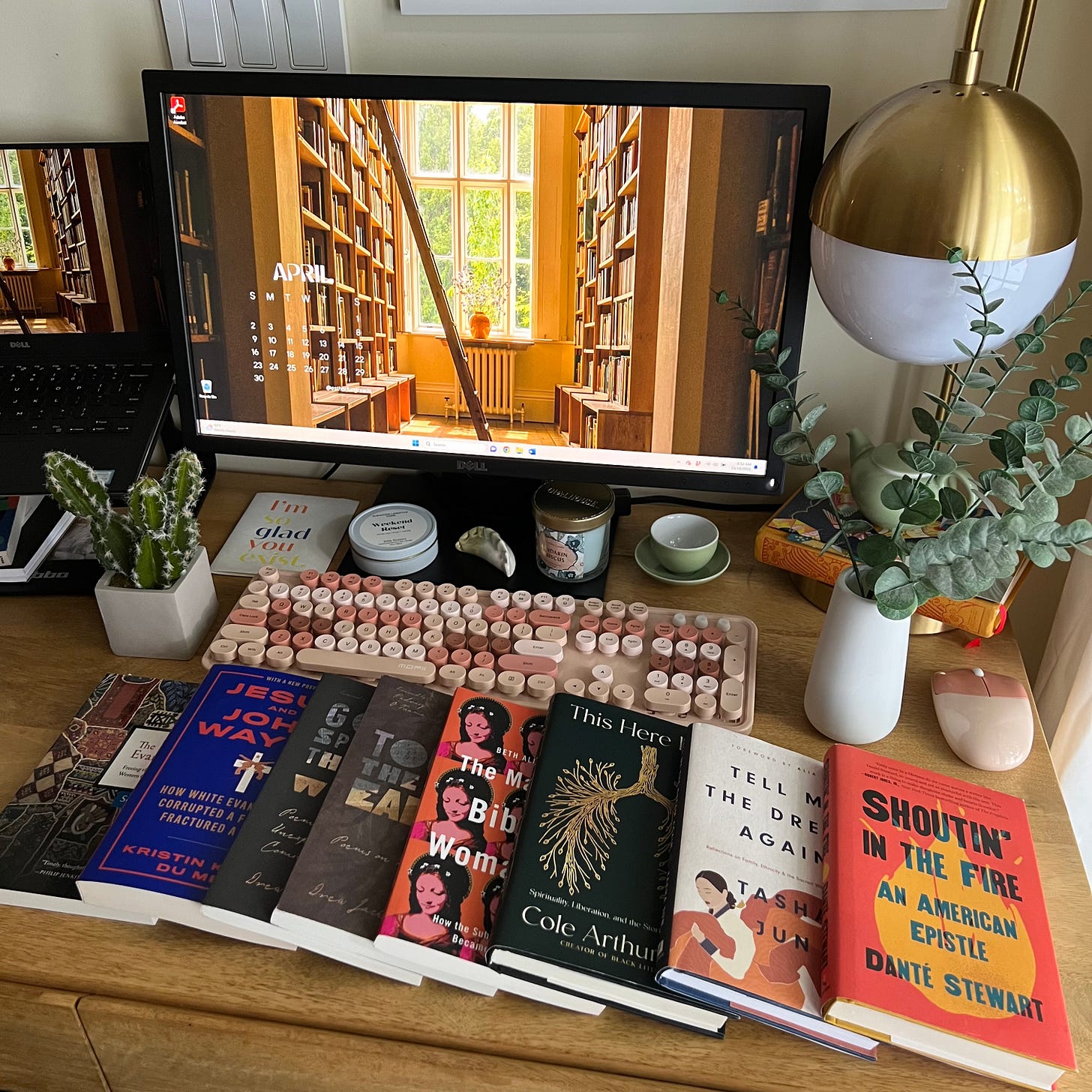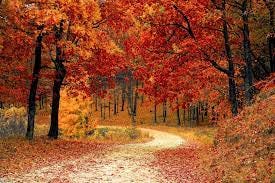When traditional evangelicalism isn't doing it for you anymore...
Nine books to accompany you as you sojourn

On a crisp fall day not unlike today during my senior year of college, a dear friend and I walked around a lake at a retreat center while we shared the doubts that had begun nibbling at the edges of our faith. A halo of red and orange leaves glowed above us, while our feet crunched a path paved with gold.
It was hard to take the beauty at face value, though, because for both of us, the faith that we’d been told was indestructable, trustworthy, and most of all, good, was starting to feel fragile, unreliable, and not so good after all. We had questions about hell. We had questions about why where someone was born - a key determinant in what religions they might be exposed to - could determine their eternal destiny. We had questions about the place of queer people and women in the church.
And even though we were at a Christian retreat center with our college fellowship, we didn’t feel like we could ask these questions out loud.
My friend eventually left the faith, while I hung on by a thread for the next decade.
One of the questions I’m asked most frequently is what books helped me when I was in this headspace (to some extent, I’m still there). That would take several posts to answer in full, but here, I want to start by pointing people to some of the more accessible writing that helped me push back against the cultural forces that have defined Christianity (especially evangelical Christianity) in narrow, constricting, and distorted terms and gave me space to imagine that I might have a place in God’s family. I’ve structured this as a quick recommendations list to make it easy to identify where to start based on how you’re feeling.
Please share with others, because if there’s one thing I’ve learned, it’s that having doubts or questions in evangelical spaces can be an isolating experience that most people go through secretly. The goal of all my writing is to bring hope and liberation to just one person who’s disconsolate, and I hope these recs will reach that person today.
If conservative evangelical church culture was everything you knew growing up…and still has a grip on you: Anything by Rachel Held Evans, starting with Faith Unraveled: How a Girl Who Knew All the Answers Learned to Ask Questions or Inspired: Slaying Giants, Walking on Water, and Learning to Love the Bible Again.
Having grown up adjacent to fundamentalism, Evans truly gets it. She wrestles with the big questions with humor, humility, and wit, giving the reader companionship on the journey rather than pat answers.
If you’re a woman who wonders if there’s a place for you in an institution that bars you from leadership: The Making of Biblical Womanhood: How the Subjugation of Women Became Gospel Truth by Beth Allison Barr.
Barr, an academic historian, outlines the historical roots of “Christian” patriarchy, demonstrating how modern evangelicalism has attempted to frame complementarian theology as Biblical fact, to the detriment of all.
If the doctrine of Biblical inerrancy has you scratching your head: If God Still Breathes, Why Can’t I?: Black Lives Matter & Biblical Authority by Angela N. Parker
Parker charts her indoctrination into the “correct”, “objective,” “neutral” methods of Biblical interpretation at Duke Divinity School and in evangelical circles, and rips to shreds the argument that there is such a thing.
If you’re a Black Christian in white spaces: Shoutin’ in the Fire: An American Epistle by Danté Stewart.
In this memoir, Stewart documents his journey of shedding his Blackness to ingratiate himself into white Reformed churches. His prose is riveting, powerful, and candid. This is a modern reckoning with the white supremacy of the American church.
If you felt despondent that 81% of white evangelicals voted for Trump in 2016 and wonder how Focus on the Family and the Religious Right came to dominate American Christianity: Jesus and John Wayne: How White Evangelicals Corrupted a Faith and Fractured a Nation by Kristin Kobes Du Mez.
Du Mez traces how the political and cultural forces of Christian nationalism have transformed American evangelicalism into something unrecognizable to the Jesus of the Bible.
If “daily devos” don’t work for you: Drew Jackson’s God Speaks Through Wombs and Touch The Earth.
Jackson’s poetry collections, inspired by the book of Luke, are deeply informed by his experiences as a Black man and pastor. He draws connections to systemic ills in modern life, and his poetry is accessible even to those who don’t often read poetry.
If you’re disillusioned with the hypocrisy of the evangelical church: The Next Evangelicalism: Freeing the Church from Western Cultural Captivity by Soong-Chan Rah
With clear, visionary prose, Rah calls out the American evangelical church for how it has become captive to individualism, materialism, and racism and encourages the church to learn from African American, Native, and immigrant communities to correct these transgressions.
If you’re a contemplative who doesn’t vibe with the energy of many evangelical spaces: This Here Flesh: Spirituality, Liberation, and the Stories that Make Us by Cole Arthur Riley.
Introspective and melodic, Riley’s reflections on her family’s stories and her embodied self affirm the dignity of our human bodies, the realities of our painful histories, and the place of mystery in considering the divine.
If you’re an Asian American Christian who feels invisible in a multiethnic church: Tell Me The Dream Again: Reflections on Family, Ethnicity, & the Sacred Work of Belonging by Tasha Jun.
With gentle storytelling, Jun explores how she reconciled her biracial Korean American identity with her faith, finally recognizing it not as a liability, but as a beautiful part of her story and song.
Want more? Let me know if you have a specific topic or book rec that you’re looking for. And please feel free to share this post with a friend or two who might need it.















I really enjoyed "Tell Me the Dream Again."
Love this list. As someone who grew up in white Christian America, I would also recommend the works of Robert P. Jones. I just finished "White Too Long" and "The End of White Christian America", and found them both incredibly compelling as I consider my own theological roots.